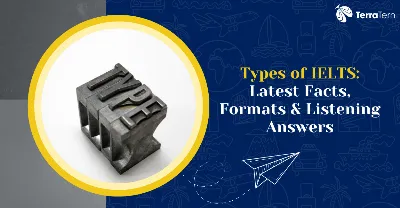Key Highlights
- Latest Facts & News (2025): Stay Ahead in Your IELTS Journey
- Understanding the Types of IELTS Exam in 2025 for Indians
- IELTS Exam Structure: Sections & Question Types
- How to Choose the Right Types of IELTS Exam in 2025? Experts Guide
- Types of Questions in IELTS Listening: “Type of Job Required IELTS Listening Answers” and Beyond
- Common Mistakes & Tips for Each Types of IELTS Test Type
- Latest Preparation Resources & Best Websites for IELTS (2025)
- Conclusion
Are you confused about which IELTS test to choose or what types of IELTS mean for your academic or migration goals? This tutorial goes over all the different types of IELTS tests and talks about the most recent changes for 2025. This will tell you what to expect in the test so you can study smarter and get the score you want.
Latest Facts & News (2025): Stay Ahead in Your IELTS Journey
-
In 2025, IELTS continues to be the world’s most popular English language proficiency test for study, work, and migration, with over 3.5 million tests taken annually.
-
IELTS now offers both paper-based and computer-delivered formats for Academic and General Training modules, increasing flexibility for test-takers.
-
The UKVI (UK Visas and Immigration) has updated its approved Secure English Language Test (SELT) list, including IELTS Academic for UKVI, IELTS General Training for UKVI, and IELTS Life Skills A1 and B1.
-
IELTS Life Skills is now required for certain UK family and work visas, testing only Speaking and Listening skills.
-
The Listening section remains unchanged: 30 minutes, 4 recordings, and 40 questions, but more digital resources are available for practice.
-
Many universities in Canada, Australia, and the UK now accept IELTS Online results for admissions.
-
The IELTS test format and scoring system remain consistent: Band scores from 0 to 9, with detailed descriptors for each band.
-
IELTS Academic is mandatory for professional registration in fields like medicine, nursing, and engineering in English-speaking countries.
-
IELTS General Training is increasingly accepted for migration to Australia, Canada, New Zealand, and the UK.
-
The “type of job required” is a common scenario in the IELTS Listening test, reflecting real-life workplace conversations.

Understanding the Types of IELTS Exam in 2025 for Indians
The forms of IELTS test-IELTS Academic, IELTS General Training, IELTS Life Skills are meant to evaluate the proficiency of English towards various objectives and situations.
-
IELTS Academic is mainly used by someone who decides to apply to universities or some professional organisations, and verifies his/her academic English level in reading and writing.
-
IELTS General Training is designed for migration, work or training reasons, with emphasis on the vocabulary, grammar, and idiomatic language of real-life situations, both social and occupational.
-
IELTS Life Skills, however, tests only speaking and listening skills and is one of the requirements for some UK visa and immigration applications.
Though all forms of IELTS have a speaking part and essentially adopt the identical format in terms of listening skills in both the Academic and the General training requirements, the reading and writing skills differ in order to correspond to the actual purpose of implementation. It is essential to book an exam based on your purpose, needs regarding higher education, work or immigration, and it is important to review the requirements of the target institution or authority before the exam. Similar words are the following phrases: IELTS exam format, IELTS test types comparison or IELTS to immigrate or study.
IELTS Academic – For Higher Education & Professional Registration
One of the primary forms of the IELTS exam is IELTS Academic, which is developed particularly to reach the learners who are planning to obtain their undergraduate or postgraduate education, whereas other candidates who are willing to be registered as a professional in English-speaking nations. This is a test that measures a high level of academic English language in areas of listening, reading, writing and speaking. It is also accepted by most institutions of higher learning, including colleges, universities, and professional institutions with a total number of over 12,500 across the world, including non-English speaking countries where English is taught as an instructional language.
Eligibility and Use Cases:
-
Intending to obtain a bachelor's degree, a master's degree or a doctorate degree overseas
-
It is through professional registration under such professions as medicine, engineering, accounting or law
-
Mandatory in countries including UK, Australia, Canada and New Zealand as well as the USA universities, higher education institutions and professional bodies
-
Appropriate for international students and working professionals who require the ability to prove knowledge of English at the academic level
Key Features:
-
Academic texts and reading works (such as the interpretation of data and essay writing)
-
The test is recognised as validated evidence of teaching or studying in English, and obtaining professional licensure as well
IELTS General Training – For Migration, Work & Training for Indians in 2025

A more significant category of IELTS exam is IELTS General Training, which includes everyday English skills in practice to migrate to the country, work, or to train. It has become a prerequisite to immigrating to such countries as Australia, Canada, New Zealand, and the UK.
Eligibility and Uses Cases:
-
Obtaining permission to migrate to English-speaking nations
-
An educational experience abroad aimed at work experience, vocation or secondary education
-
Needed to obtain work visas and some of the non-academic study courses
Key Features:
-
Readings and writings according to work and social context (e.g. letters, advertisements, manuals)
-
The academic test is similar to Listening and speaking sections
-
Accepted by immigration agencies and employers of the bigger English-speaking nations.
IELTS Life Skills – For UK Visas
IELTS Life Skills is a form of IELTS examination approved by the government of the UK, which only tests the speaking and listening skills. It is mandatory in certain kinds of UK visas, like family visa, spouse/partner visa and citizenship.
To Whom This Test Is Needed:
-
Family of payee under the family of a settled person (A1 level)
-
Individuals who are to apply to extend a visa into the spouse or parent category (A2 level)
-
People who are applying for an indeterminate stay granted or British citizenship (B1 level)
Key Features:
-
Special tests: tests of speaking and listening
-
The highest scores are not marked (they pass or fail)
-
Only accepted in select applications of UK visa and immigration
UKVI IELTS (General & Academic Training)
IELTS for UKVI is the name of Secure English Language Tests (SELT) approved by the UK government to qualify visa and immigration. The format and content of the test are identical to a standard IELTS Academic and General Training, but these tests must be taken in UKVI-approved centres and advanced identity checking is involved.
Key Differences from Standard IELTS:
-
Needed to apply for a UK visa (Student, Skill Worker, etc.)
-
IELTS is available in three forms, namely IELTS for UKVI Academic, IELTS for UKVI General training, and IELTS Life skills
-
The UKVI centre information appears in the test reports and complies with the Home Office security arrangements
|
Feature |
IELTS Academic |
IELTS General Training |
|
Purpose |
Higher education, professional registration |
Migration, work, vocational/secondary education |
|
Reading/Writing Focus |
Academic texts and data analysis |
Social, workplace, and everyday contexts |
|
Recognition |
Universities, professional bodies |
Immigration, employers, training institutions |
|
Test Format |
Four skills: Listening, Reading, Writing, Speaking |
Four skills: Listening, Reading, Writing, Speaking |
IELTS Exam Structure: Sections & Question Types
The IELTS examination framework is aligned in judging English language skills in four primary areas, which include: Listening, Reading, Writing, and Speaking. Every part has question types that test a variety of language competencies, and the structure of the questions on all key types of IELTS (Academic and General Training) is similar, with one or two variations in the Reading and Writing sections. Knowledge of the pattern and format of the questions that are frequently asked, e.g. type of job required IELTS listening answers, is of importance to make successful preparations and the desired score.
|
Section |
Number of Questions |
Timing |
Key Question Types |
Notes (Academic vs. General) |
|
Listening |
40 |
~30 minutes |
Multiple choice, form/note/table/map completion, labelling diagrams, short-answer |
Same for both modules |
|
Reading |
40 |
60 minutes |
Multiple choice, matching, True/False/Not Given, sentence completion, summary completion |
Texts differ: Academic (scholarly), General (workplace/social) |
|
Writing |
2 tasks |
60 minutes |
Task 1: Report (Academic) / Letter (General), Task 2: Essay |
Task 1 differs by module |
|
Speaking |
3 parts |
11–14 minutes |
Introduction/interview, long turn, two-way discussion |
Same for both modules |
Listening Section – Format, Tips, and “Type of Job Required” Answers

Listening is the fourth section of the IELTS test that is composed of four audio files of different accents and real-life situations. The questions are 40 in number on formats including multiple choice, note/table/form completion and diagram labelling. The typical examples easily found in the world are job applications where the candidate might be asked about the kind of job one is seeking, and a common theme in the world that tests your skill in determining exactly what one is talking about.
Types of Sample Questions:
-
Multiple choice
-
Matching
-
Form, note, table, flow chart, summary completion
-
Sentence completion
-
Map/diagram labeling
Answer Strategies:
-
Listen when instructions and questions have been read.
-
Develop an interest in keywords and synonyms.
-
and it helps to practise listening with real IELTS listening answers, particularly in situations such as in type of job required, to use common words and understand commonly used situations.
-
Test under test conditions using formal practice material to become more precise.
Reading, Writing, and Speaking – What to Expect in 2025?
Here is what to expect from reading, writing, and speaking:
IELTS Reading
The Reading section features three passages (Academic: scholarly articles; General: work/social texts) and 40 questions. Common question types include:
-
Multiple choice
-
True/False/Not Given
-
Matching headings/features
-
Sentence completion
-
Summary/note/table/flow-chart completion
IELTS Writing
The Writing section has two tasks:
- Task 1: Academic – describe/interpret a graph, chart, or diagram; General – write a letter (formal, semi-formal, or informal).
- Task 2: Essay on a given topic (both modules).
Key preparation involves practising with academic topics and real-world scenarios.
IELTS Speaking
The Speaking test is a face-to-face interview with three parts:
-
Introduction and interview (personal questions)
-
Long turn (speak on a topic for 1–2 minutes)
-
Two-way discussion (questions related to the topic)
This section tests fluency, coherence, vocabulary, grammar, and pronunciation.
How to Choose the Right Types of IELTS Exam in 2025? Experts Guide
When you are in a dilemma, thus asking yourself, which type of IELTS examination should I take, it all depends on your goals. Do you intend to study, migrate, or work in a country where the language that is spoken is English? These are the main forms of IELTS exams, including IELTS Academic, IELTS General Training and IELTS Life Skills (visas in the UK). Here is how one can make the decision:
1. Choose IELTS Academic if you want to:
-
Become a student to an undergraduate or postgraduate degree at an English-speaking country at the university or college level.
-
Request professional registration in a field such as medicine, engineering or law.
2. Choose IELTS General Training if you want to:
-
Move to places like Australia, Canada, New Zealand or the UK.
-
Carry out work experience, vocational training or undertake below-degree level studies.
-
Prove English knowledge in occupational or daily situations.
3. Choose IELTS for UKVI or Life Skills if you need:
-
It is a Secure English Language Test (SELT) required to apply to the UK as a visitor or to obtain a visa.
-
Speaking and listening UK family, spouse or citizenship visa proof UK (Life Skills A1, A2, B1).
Types of Questions in IELTS Listening: “Type of Job Required IELTS Listening Answers” and Beyond

The Listening part of IELTS consists of a number of question types, which are intended to measure your capabilities to comprehend the real-life situations presented in spoken English. Most of them include such types of job required IELTS listening answers settings when a student is to find certain kinds of job-related information in the conversation or in the monologue form, note or table completion tasks.
Typical Question types in IELTS listening
-
Form, Note, Table Completion: Supply the information you hear missing, like job post, duties or requirements.
-
Multiplex: Select an option in which multiple choices are provided.
-
Matching: pair speakers or statements with categories or options.
-
Labelling Diagrams/Maps: Locate places or sections by using descriptions.
-
Short Answer Questions: Answer some particular questions briefly.
Concentrate on the Scenario of Type of Job Required
In the given case, you may listen to the conversation of an employer and the job applicant or to the discussion of job roles. Most of the time, the task is filling a form or a table with your data, such as the position, qualifications, or duties.
Common Mistakes & Tips for Each Types of IELTS Test Type
Knowledge of common IELTS errors and implementation of specific IELTS exam strategies can make a big difference in effective improvement of your band score in any kind of IELTS exam. The most frequent traps and how-to-do-it strategies of every module are as follows:
Listening
The common listening mistakes and advice are:
Common Mistakes:
-
Not paying attention to the instructions (for example, not seeing the word restrictions).
-
Focusing on one answer and overlooking the next question.
-
Not paying attention to synonyms or reworded information in the tape.
Advice:
-
Before you answer, always read the directions and the word restriction.
-
If you're not sure, go on. Don't spend too much time on one question.
-
In listening activities, practise finding synonyms and paraphrases.
-
Use official practice exams to become used to the types of questions and the speed of the test.
Reading
The common reading mistakes and advice are:
Common Mistakes:
-
Taking too long on one question or part.
-
Not paying attention to headings, introductions, or keywords.
-
Not being able to tell whether words are paraphrased or synonyms.
Advice:
-
First, read the paragraphs quickly to get the essential ideas, and then look for solutions.
-
Underline or highlight important words in both the questions and the passages.
-
Keep in mind that some sorts of questions follow the arrangement of the material. Use this to your advantage.
-
Read a lot of different things to improve your vocabulary and quickness.
Writing
The common writing mistakes and advice are:
Errors:
-
Writing too few or too many words.
-
Not answering the question directly or moving off subject.
-
Using idioms and transition phrases too much or in the wrong way.
-
Bad paragraphing and no obvious structure.
-
Mistakes in grammar and a small vocabulary.
Advice:
-
Plan your essay and make sure that each task has the right number of words.
-
Answer all elements of the question and give a clear opinion or summary.
-
Use a variety of syntax and vocabulary, but only words and structures that you are sure about.
-
Put your thoughts into coherent paragraphs, with one primary topic in each.
-
Look over model answers and practise writing with a time limit.
Talking
The talking common mistakes and advices are:
Errors:
-
Remembering replies or sounding fake.
-
Not talking enough, merely saying "yes" or "no."
-
Using too many idioms or transition words can make things feel forced.
-
Saying the same thing over and over or copying the question.
-
Not being able to pronounce words correctly or not being sure of yourself.
Advice:
-
Talk in a natural way and give examples or explanations to back up your responses.
-
Speak your mind and talk about different things out loud.
-
To avoid repeating yourself, use different words and synonyms.
-
If you don't get a question, ask the person giving the test to explain it. It won't hurt your score.
-
Record yourself so you can find out where you need to work on your pronunciation and fluency.
Latest Preparation Resources & Best Websites for IELTS (2025)

Below are the preparation resources and best websites for IELTS:
Best IELTS Books for 2025
The best books for IELTS preparation are:
-
The Official Cambridge Guide to IELTS
Covers: Both Academic and General Training, with full-length practice tests and step-by-step strategies. -
Barron's IELTS Superpack
Covers: Comprehensive skill-building, vocabulary, and practice tests. -
IELTS Trainer by Cambridge
Covers: Six full practice tests, exam tips, and answer keys.
Recommended YouTube Channels
The recommended YouTube channels are:
-
Learn with Sam and Ash – Topic-wise playlists and quick tips.
-
E2IELTS – Writing and speaking strategies, mock tests.
-
IELTS Advantage – Essay writing and speaking samples.
Finding reliable IELTS preparation resources is essential for achieving your target band score. The best websites for IELTS in 2025 combine official practice materials, interactive tools, and up-to-date strategies tailored for all types of IELTS exams. Below is a curated list of top official and unofficial platforms, including their strengths and drawbacks, to help you prepare effectively.
Top Official IELTS Preparation Resources
The table below illustrates the top official IELTS preparation resources:
|
Resource Name |
Provider |
Key Features |
Access Type |
|
Official IELTS Preparation Resources |
IELTS (Main) |
Apps, webinars, practice tests, free sample questions, exam guides, strategies |
Free & Paid |
|
IELTS Test Preparation Materials |
IDP IELTS |
Practice tests, webinars, articles, podcasts, masterclasses, study plans |
Free & Paid |
|
IELTS Ready Platform |
British Council |
Personalised study plans, practice questions, free & premium packages, mini-mock, AI feedback |
Free & Premium |
|
IELTS Prepare |
IDP IELTS |
Resource hub by skill, free & paid content, videos, practice tests |
Free & Paid |
|
Official IELTS Practice Materials |
Cambridge/British Council |
Books, sample tests (with answers), examiner commentary, audio/video components |
Paid (Books) |
|
Sample Test Questions |
IELTS (Main) |
Official sample tests for all four modules |
Free |
|
The Official Cambridge Guide to IELTS |
Cambridge University Press |
Comprehensive book for Academic & General, full practice tests, band descriptors |
Paid (Book/eBook) |
Conclusion
In conclusion, There are a fe types of Ielts and taking one of the IELTS exams (Academic, General Training, Life Skills, or UKVI) is up to your own goals, which may be academic-oriented or more professional or immigration-oriented. Offering new options in digital, and modernized requirements in 2025, IELTS will continue to provide flexibility and ensure opportunities to study, work, or a new life abroad to candidates across the globe. The knowledge of the organisation of any of the tests and the usage of official and high-quality materials will increase your confidence and test-day preparedness. With the selection of the most common question types, practising valuable techniques and utilising the modern resources of preparation, you will be able to walk towards your IELTS with a confident step, hit the desired band to advance to the next wish of yours in the international world.
To find assistance in finding the best among the types of IELTS, contact TerraTern right away!








